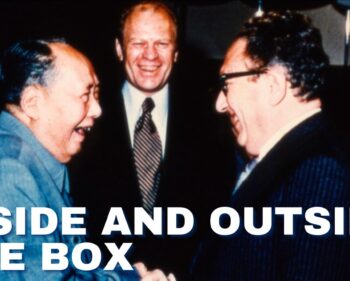SHLOMO CARLEBACH’S LAST CONCERT
Rabbi Pini Dunner shares his experience of having spent a full week with Rabbi Shlomo Carlebach, in what turned out to be the final week of his life. This poignant article, full of wonderful memories and incredible moments, is accompanied by a previously unreleased recording of Shlomo Carlebach’s last major concert, at Ronnie Scott’s jazz club in the West End of London, on October 16th 1994. Shlomo passed away just four days later, on October 20th.
It turned out to be the last week of his life – but of course none of us had any idea about that. Shlomo Carlebach was a fixture of the Jewish world, and although he was certainly getting older, and we all knew he had medical issues, he was still composing and recording fresh new songs and performing regularly at concerts.
At my wedding in December 1993, as we hugged and said goodbye, I whispered in Shlomo’s ear – “Will you come back for longer next time? I’ll arrange a few good concerts.” He held my shoulders and looked me in the eye with a beaming smile – “Holy Pinnever Rebbe! It will be my greatest honor!”
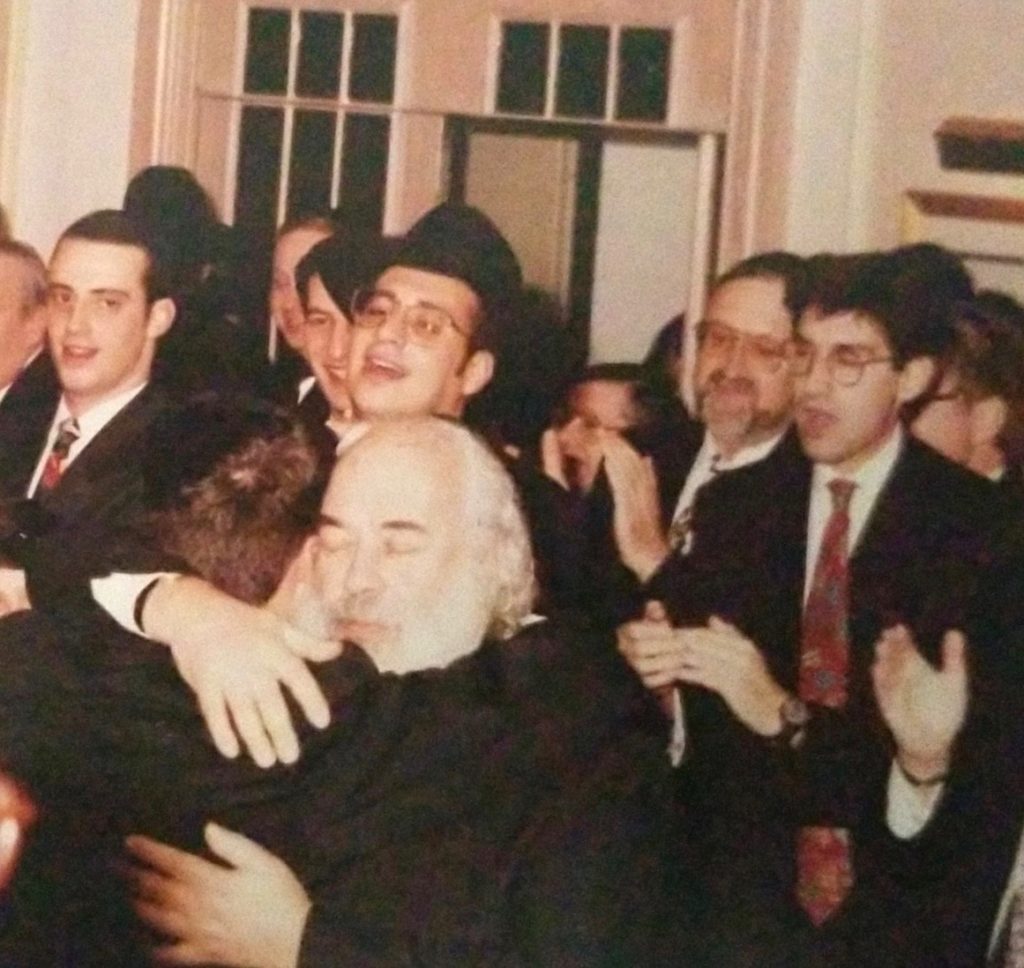
Rabbi Shlomo Carlebach dances with Rabbi Dunner at his wedding in December 1993
We chatted regularly after that, as we always did, and I began to put out feelers to shuls and Jewish organizations across England to try and get some bookings. After talking through various options, we decided that after Sukkot looked like the best time for Shlomo’s extended visit – he was free to be in England for at least a week, and there were a number of possibilities for concerts.
I had first gotten to know Shlomo whilst studying in Gateshead Yeshiva in 1986. (How I got to know him is itself a crazy story that I recently recalled in a Zoom interview with Rabbi Yoni Golker – you can watch the interview here.)
Shlomo used to call me regularly from all over the world. When I was in yeshiva and he called on the public phone he used the alias ‘Moshe Kohn’ so that I didn’t get into trouble.
In 1987 I organized a concert for him in London on chol hamoed Sukkot (the recording is available here on Amazon). It was my first ever Shlomo Carlebach concert. It was aimed specifically and very obviously at yeshiva boys and the Charedi community, which made it extremely controversial, and although I had tried to remain anonymous, somehow the word got out that I was the organizer.
The mashgiach of Gateshead Yeshiva at the time, Reb Matisyahu Salomon, was not happy with me at all. But despite his opposition and attempts to shut it down, thankfully I managed to keep things on track, and later on I sold the live recording of the concert to Jonathan Tischler at House of Menorah on Eldridge Street, in the Lower East Side.
In 1988 I went to yeshiva in Baltimore, and the following year to Jerusalem. I began to see Shlomo more and more, first in the United States and then in Israel. I would spend Shabbes with him and often joined him on stage at concerts, playing guitar and singing harmony to his vocals.
During that time I arranged dozens of formal and informal concerts for him. The most notorious of these was one that took place at the Kotel after midnight one Thursday night in January 1990 – once again, it was a concert aimed at yeshiva bochurim. That particular concert earned me a nidui (excommunication) from one of Jerusalem’s leading Roshei Yeshiva.
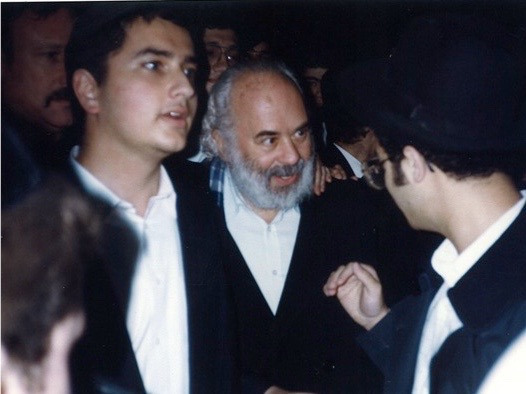
Rabbi Dunner at the Kotel kumzitz for yeshiva bochurim with Rabbi Shlomo Carlebach in January 1990
When I moved back to London in 1991, I began to introduce anyone and everyone I spoke with to the music and stories of Shlomo. Forget your preconceptions and misconceptions, I would tell them, it’s time for you to hear real Jewish music — music from the soul.
Soon enough Shlomo began to stop over in London whenever he was on his way from Israel to New York or vice-versa, to share an evening with the ever-increasing group of new fans. Shlomo had always considered the London Jewish community one of the least responsive communities in the world as far as his music was concerned, but in those last years the revival was remarkable.
Shlomo was very excited when he heard I was getting married. “Mrs Pini for Queen!” he proclaimed at the legendary Notting Hill Melava Malka concert in early 1993. “Shlomo, we’re not yet engaged!” I tried to tell him, but it was too late. Shlomo had spoken.
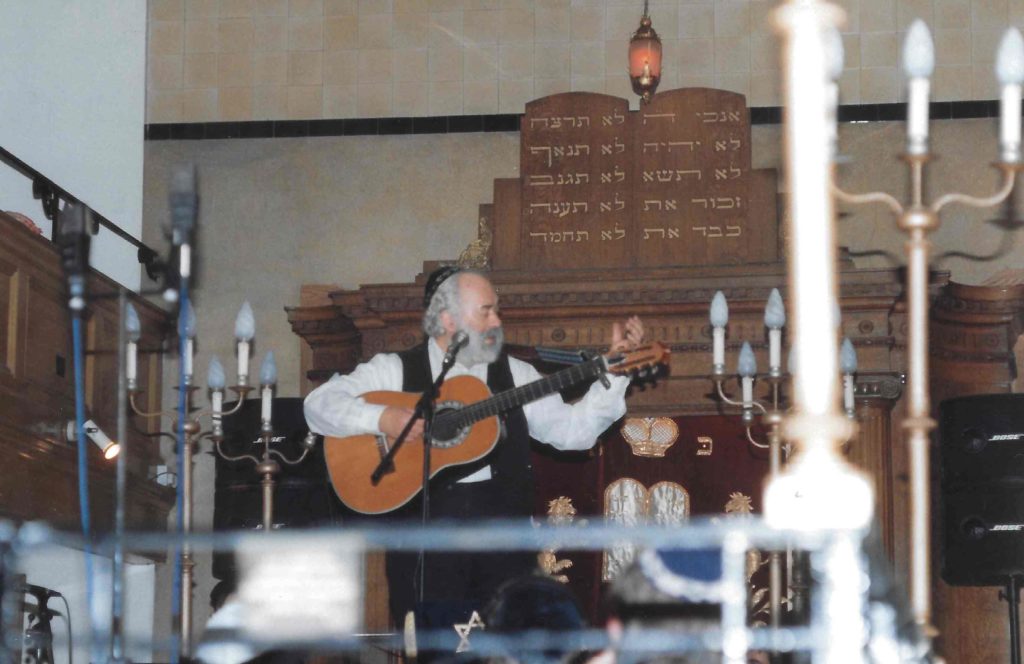
Rabbi Shlomo Carlebach at Notting Hill Synagogue in January 1993
He came to the wedding at his own expense – he wouldn’t take a penny from me for anything. And… he brought his ex-wife Neila as well as his daughters Neshama and Dari.
At the wedding dinner he sat next to his former chavrusa from Lakewood yeshiva, Rabbi Mordechai Elefant, the Rosh Yeshiva of ITRI; they hadn’t seen each other for decades.
After bentching hundreds of guests stayed on to sing with Shlomo as he led a kumzitz and spun together stories and Divrei Torah in his unique style.
It was very moving saying goodbye to him. I told him that as soon as I could I would arrange a concert for him in London that would top all his previous appearances over the last decade. And ten months later he was back – and so began those last few days together, a memory I will cherish forever.
Shlomo arrived in London on October 11th, 1994. I had arranged for him to stay at the recently opened Holiday Inn Brent Cross, quite close to our home in Hendon. He was scheduled to give concerts in various communities around England, and to be back in London for Shabbes.
I had planned for him to stay at the hotel for Shabbes – he always told me he didn’t like staying in people’s homes as he preferred the privacy of a hotel room – but unexpectedly he asked if he could stay with us for Shabbes, as he didn’t want to walk to and from the hotel. I must have looked very surprised, so he gave me a hug, and explained that he wasn’t feeling so great — nothing too bad, but he just wanted to be in one place and not schlep around.
I asked him if he wanted me to arrange for him to see a doctor. He smiled. “Brother Pini – you’re mamesh the best, but it’s ok. It’s not necessary. All I need is some good chicken soup from Sabine and I’ll be fine.”
Friday arrived. I was so excited. I couldn’t quite believe it — Shlomo Carlebach was coming to stay with us for Shabbes! In my wildest dreams I would never have imagined it. But it was really happening.
He was such a kind person, and so considerate. He made clear that he didn’t want to come into the house until just a few minutes before Shabbes – he was concerned that if he was in the house during the day, he would disturb Sabine’s preparations, as she would feel the need to fuss over him. He also asked me to direct him to a florist so that he could buy her some flowers.
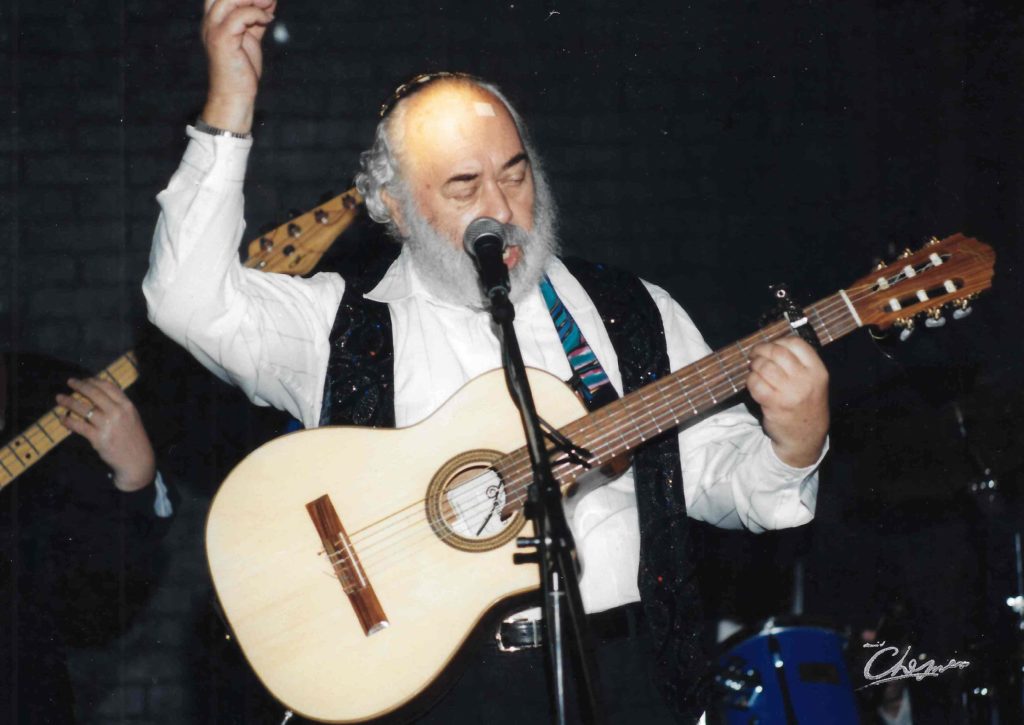
Shlomo requested that I arrange a minyan in the house for Kabbalat Shabbat – he didn’t want to walk to shul and back. I knocked on a few doors until we had about fifteen people. As soon as they arrived we began to sing the familiar nusach together with him: Lechu Neranena… we were all in seventh heaven – and just imagine, although we didn’t know it then, this was Shlomo’s last Kabbalat Shabbat davening. The singing was so special, I’ll never forget it, and nor will anyone else who was there.
We had a lot of people over for the seuda, and more kept on arriving as the evening progressed. We sang every one of Shlomo’s Shabbes songs that we knew. He reminded us of a few, and we reminded him of others that he had long forgotten. He smiled with such pleasure as he revisited melodies he hadn’t heard for years.
In between songs he regaled us with Divrei Torah and drew us into the world of different Chasidishe Rebbes with heartwarming stories and anecdotes. We didn’t finish until 2am, but none of us felt the hours pass by.
On Shabbes morning we both met on the landing before going downstairs. I had to pinch myself. Was I dreaming? It was 8am on a Shabbes morning and Shlomo Carlebach was in my house!
The front page of the newspaper was full of the devastating news story that Nachshon Wachsman, an IDF soldier kidnapped by Palestinian terrorists, had been killed in a botched rescue attempt the night before. We both sat and contemplated this terrible news. He turned to me with the saddest eyes I had ever seen. “When will the hatred end?” he asked me. I didn’t have anything to answer.
We headed out to shul. What would normally have been a five-minute walk took twenty minutes. Shlomo stopped every few moments to catch his breath. He kept on reassuring me he was fine, that it was only a bad cold. I told him that there would be doctors in shul, but he said he didn’t need a doctor.
When we got there he went into the Beis Midrash before going into the main shul, so that he could stock up on some good seforim. Once he had gathered quite a few together we came inside and settled into the back row.
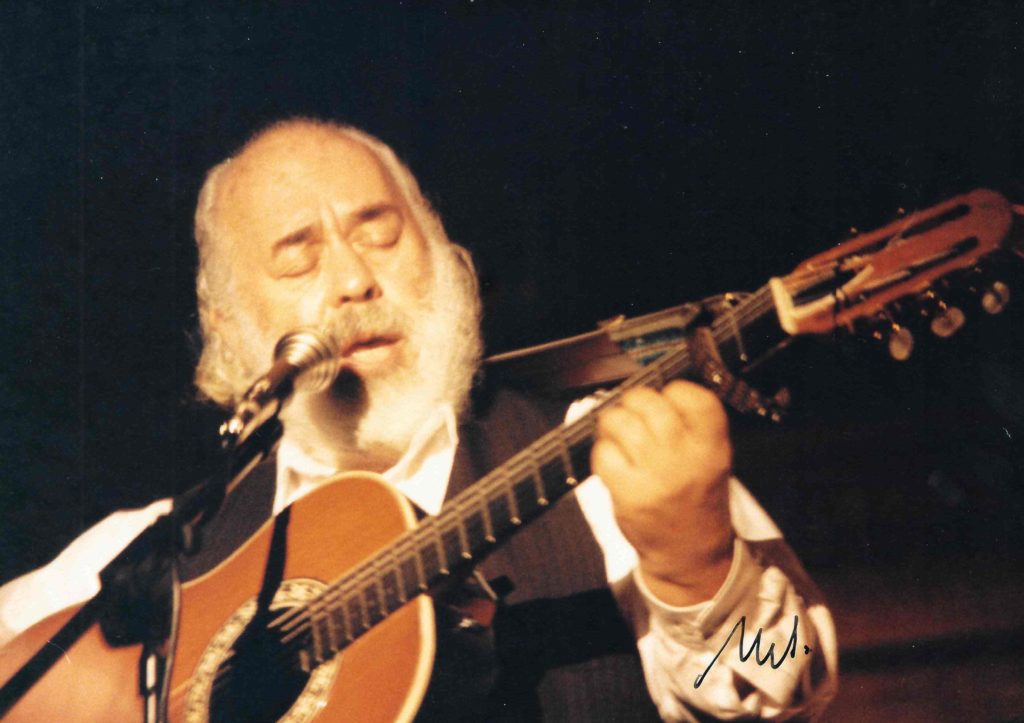
I noticed there was a lot of whispering going on among the gabboim. They had clearly noticed Shlomo was there and were looking across at him. I soon realized what was going on. They were thinking to themselves, should they give him an aliya? Some were saying “of course – he’s a guest.” But others were saying, “we can’t give Shlomo Carlebach an aliya, even if he is a guest.” Shlomo seemed completely oblivious to all of this; he was deeply immersed in his pile of seforim.
Ultimately Shlomo was not called up to the Torah on his last Shabbes. When it dawned on me that without my intervention he probably wasn’t going to get an aliya, I asked him if he wanted me to arrange it for him, but, typically, he didn’t want to make a fuss. He did tell me, though, that he had been to the same shul many years earlier and that exactly the same thing had happened then.
We went to lunch at Sabine’s parents, Josl and Esther Ackerman. A crowd had gathered and we sang together and he told a few stories. Later on, once we were home, we were joined by my friend Yossi Fachler for a small Shalosh Seudos. Yossi launched into a range of Shlomo’s songs, mimicking the style of his singing from each album and era. Shlomo was crying with laughter, tears rolling down his cheeks with every nuance and exaggeration.
The main event of Shlomo’s visit was the concert I had arranged at Ronnie Scott’s jazz club in London’s West End on Sunday night, October 16th. Ronnie Scott (1927-1996) was born into an immigrant Jewish family called Schatt in the East End of London, but he drifted away from his Jewish roots, becoming a celebrated jazz saxophonist, and in 1959 he opened what would later become one of London’s best-known and most popular jazz clubs.
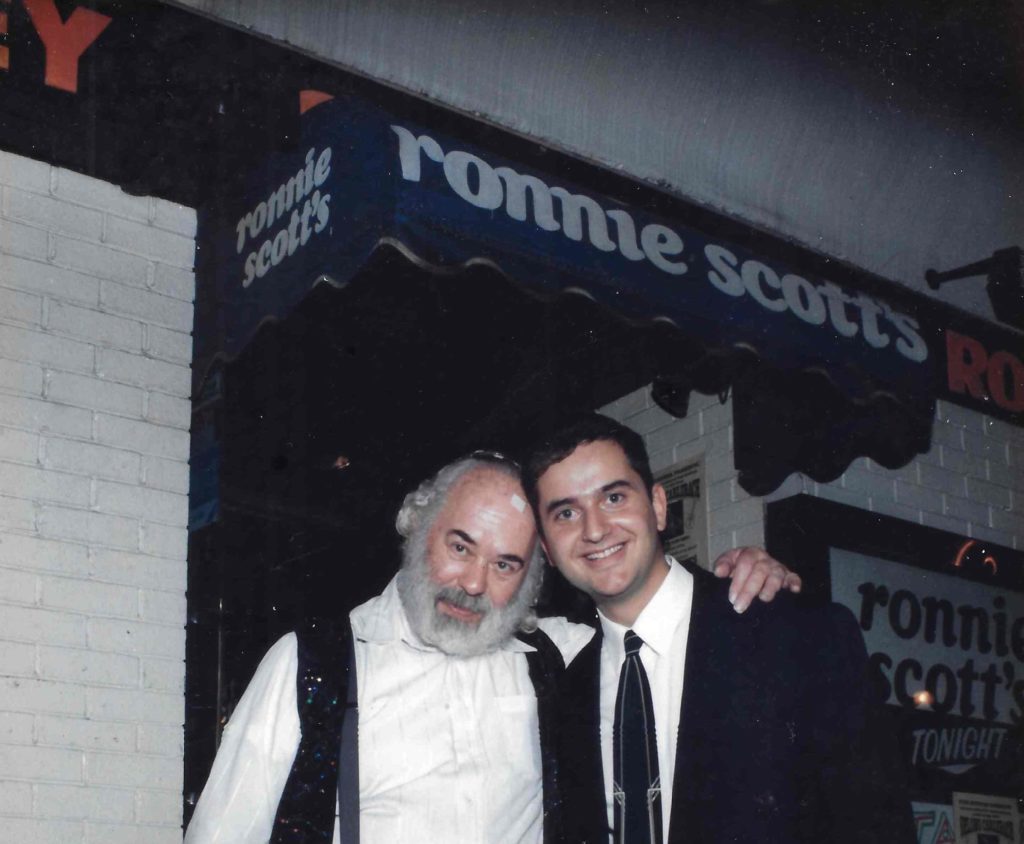
At some point someone had introduced me to one of the schedulers at the club, a fellow called Stuart. He was Jewish, and he seemed genuinely excited at the prospect of arranging a Jewish music event at this famous jazz venue.
The particularly unique aspect of Ronnie Scott’s was that it doubled as a restaurant, and after some negotiations I was able to get them to agree for us to serve a glatt-kosher dinner at the concert. It was a first. No one in London had ever done anything like this before. I contacted a friend of mine, Simon Kalman, to help me get it done (Simon sadly passed away last year after a difficult illness).
Simon was a kosher food fixer par excellence; there was nothing he liked more than a kosher food logistics challenge, and this project was undoubtedly a challenging prospect. How he managed to get it all arranged – a 3-course high-end glatt-kosher dinner with wine at Ronnie Scott’s – I will never know, but the result was spectacular.
The concert tickets went on sale a week or two before Rosh Hashana. There were only 250 seats available, and we were sold out within a few days. I tried to shoehorn in a few extras, but the limitations of space meant that those who got in early were the lucky ones, and that was it.
Sunday night arrived and the scene was surreal – Jews with yarmulkes and sheitels queuing up outside a West End night club on a Sunday night. After a few logistical hiccups everyone was eventually seated and served their food — and the concert began.
It was an amazing evening. The whole audience was on their feet dancing. Young, old, religious, secular — everyone was united in the music and the dancing. Shlomo sang old favorites and new songs, and he told us some wonderful stories. Even Ronnie Scott showed up – he wanted to know what all the fuss was about. Soon he was dancing too, caught up in the spirit of Shlomo’s soul music.
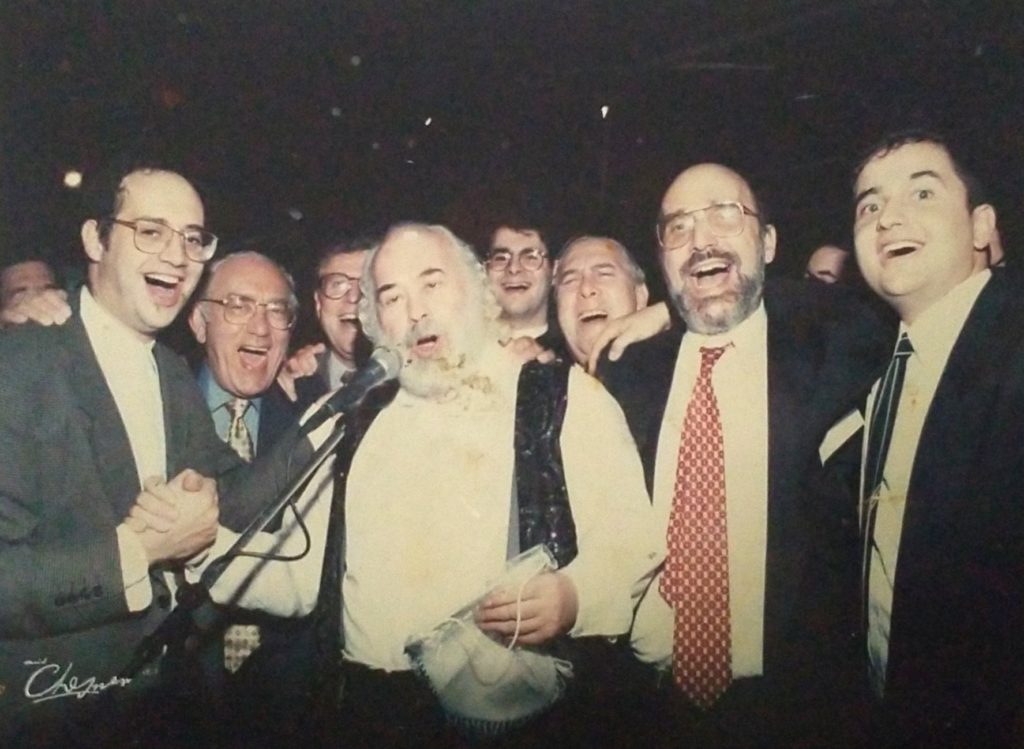
Ronnie Scott’s concert finale l-r: Rabbi Zev Dunner, Yankel Plitnick, Graham Morris, Rabbi Shlomo Carlebach, Razi Davidoff, Nachmi Barsam, Rabbi Aba Dunner, Rabbi Pini Dunner
As had been my custom from the very first time I organized a Shlomo concert, I arranged for the sound desk to record everything so that I could listen back to it later. That recording has accompanied me everywhere I have been ever since, and it is my pleasure to finally share the pre-intermission part of the concert for you to enjoy. It is truly a unique recording. That is because just four days later our beloved Shlomo, who inspired us all with his music and his warmth, was dead.
The night after the concert Shlomo sang for a group of IDF veterans who were in London and had attended the concert as guests of philanthropist Yankel Plitnick, a longtime Shlomo Carlebach fan who had organized concerts for him in London as far back as the 1960s. The Monday night invitation-only kumzitz was at the home of Philip and Suzy Goldberg, and they invited their friend, Israeli singer Dudu Fisher, who happened to be in London as the star singer in a West End musical. Dudu told us that night that his first-ever paid singing gig was as a backing singer for a Shlomo Carlebach album – Veha’er Eneinu – in 1972.
Once again, Shlomo sang and told stories until late into the night. The following day he traveled to Manchester, where he sang at another concert, and then at someone’s home near the concert venue.
I didn’t accompany Shlomo to Manchester. We said our goodbyes on Tuesday morning, and I took him to the airport. After the concert in Manchester was over and he finally got to his hotel room he called me. For some reason — probably because it was one or two in the morning! — I didn’t pick up the phone, so he left me a voicemail message. He just wanted to tell me that the concert in Manchester had been “cute” – a Shlomo euphemism for “less than satisfactory”!
That was the last message Shlomo ever left me. On Wednesday morning he flew back to New York. He still wasn’t feeling well and as soon as he got home he went to sleep. But when he woke up he still felt terrible.
His daughters, who lived in Toronto with their mother, suggested he should come to them for Shabbos. So he canceled his New York engagements and made his way to La Guardia airport where he boarded a plane for Toronto. But as the plane was taxiing for take-off, Shlomo’s soul returned to God, fulfilling King David’s words Haneshama Lach – “the soul is Yours” – words made particularly famous by the title song of Shlomo’s first album. It was October 20th 1994.
At the Ronnie Scott’s concert on Sunday night Shlomo had asked for requests. Everyone shouted out their favorite song: Esa Einay! Mimkomcha! Kevakoras! U’vney Yerushalayim!
“Chap nisht, Chap nisht,” Shlomo responded, “I can’t sing everything tonight, and anyway – I’ve got to leave something over for next time!”
But there never was a next time.
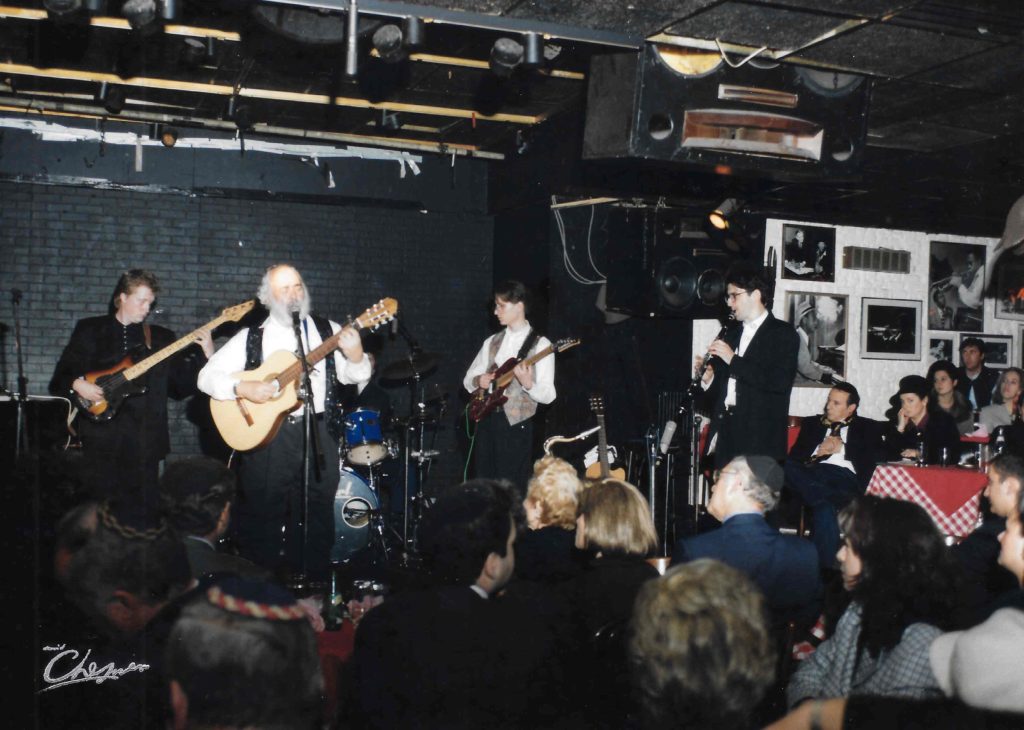
Rabbi Shlomo Carlebach on stage at Ronnie Scott’s jazz club, in London’s West End, on October 16th 1994
CONCERT RECORDING RUNNING ORDER:
00:00:13 YEHI SHALOM
00:02:58 EIN KELOIKEINU (NO WORDS)
00:04:57 VE’HAR’EINU
00:08:19 LULEI TOIROSCHO
00:10:31 RETURN AGAIN / VEHOSHEIV
00:13:50 THE SEER OF LUBLIN’S BARBER
00:23:22 RIZHINER NIGGUN
00:30:22 MEHEIRA
00:35:48 MIMKOMCHA
00:40:44 “TENOIM” NIGGUN
00:47:30 SIMEN TOIV
00:50:35 STORY: R. MORDECHAI LEIB WINKLER
00:58:50 CRACOWER NIGUN



